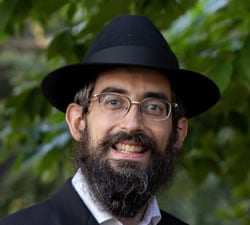|
Getting your Trinity Audio player ready...
|
Kabbalah teaches that whenever we sit down to a meal in the sukkah during the festival of Sukkot, we’re joined by seven spiritual guests. Read on for 13 facts about these otherworldly visitors who bring a unique aura to our holiday each year.
1. They Join Us Every Day of Sukkot
According to the Zohar, the primary text of Kabbalah, every time you sit down to eat in the sukkah on Sukkot, seven spiritual guests join you.1 These honored guests are our forefathers Abraham, Isaac, Jacob, and King David, who are mentioned by name in the Zohar. Later sources add Joseph, Moses, and Aaron to complete the group of seven tzaddikim (righteous individuals).2
Read: The Ushpizin
2. “Ushpizin” Means “Guests”
The word ushpizin (singular: ushpiza) means “guests” in Aramaic. This term is used instead of the Hebrew word orchim because the Zohar, the source of this mystical idea, was written primarily in Aramaic.
Read: 11 Facts About Aramaic
3. One Guest Takes the Lead
All seven guests visit every day, but each day, one of them takes the lead. For example, Abraham is the main guest on the first day of Sukkot, while Isaac is the leading guest on the second day. This continues throughout the holiday, with David gracing the seventh day (known as Hoshana Rabbah).3
Read: 18 Facts About Abraham
4. The Order Isn’t Chronological
Some traditions sequence the guests chronologically—Abraham, Isaac, Jacob, Joseph, Moses, Aaron, and David. However, Lurianic tradition places Moses and Aaron before Joseph, following the order of the supernal sefirot. Moses is thus the lead guest on day four, Aaron on day five, Joseph on day six, and David on day seven.4
Read: 17 Facts About Moses
5. We Invite Physical Guests Too
Just as you would serve food to physical guests, the Zohar teaches that we must “feed” the ushpizin by hosting the needy. The Zohar even says that if someone invites the ushpizin without giving to the poor, the spiritual guests leave the sukkah in displeasure.5 Beyond those who lack food, you should also invite those who lack a sukkah and would otherwise not do this mitzvah.
6. Some Extend Verbal Invitations
Many have a tradition of verbally inviting the ushpizin into the sukkah before each meal with an Aramaic declaration. This prayer, found in many siddurim, names the lead guest of the day first, followed by an invitation to the other six. However, this is not Chabad custom.
7. We Do It With Joy
Imagine how excited you’d be to host a famous leader or celebrity! On Sukkot, we each get to host not just one, but seven of the greatest spiritual figures in history. The Zohar therefore encourages us to welcome these special guests with joy and radiance.6
8. They Bless Their Hosts
The Zohar says that each ushpiza blesses his hosts with a verse from the Torah7 that reflects that ushpiza’s unique spiritual qualities.8 For example, Isaac’s blessing includes, “May your progeny be mighty in the land,”9 highlighting his spiritual quality of strength and discipline, while Jacob’s verse includes the word yibaka (יבקע),10 which can be rearranged to spell Jacob (Yaakov in Hebrew—יעקב).
9. There Are Also the “Chassidic Ushpizin”
In Chabad tradition, the seven ushpizin are joined by seven great Chassidic leaders: the Baal Shem Tov, the Maggid of Mezritch, and the first five Chabad Rebbes. Just like the traditional ushpizin, they all visit every day, with a different Chassidic leader being the primary guest each day.11
10. Dine Them With Torah
Sharing words of Torah during a meal elevates it into a spiritually meaningful experience.12 On Sukkot, it is customary to share teachings connected to the lead ushpiza of the day.13 This helps to connect the meal and its participants with the spiritual legacy of the guests.
11. They’re Really There
Certain tzaddikim with a heightened sense of spiritual vision were said to actually perceive the presence of the ushpizin in their sukkah. Some even prepared extra chairs for them.14 Rabbi Yosef Yitzchak Schneersohn, the sixth Lubavitcher Rebbe, of righteous memory, would point out where each of the Chassidic Rebbes was seated at his table.15
Read: What Is Spirituality?
12. King Solomon for Shemini Atzeret
Although the ushpizin tradition officially ends with David’s visit on Hoshana Rabbah, some sources indicate that King Solomon is also a member of this celestial group. It follows that he is the primary guest on Shemini Atzeret, when Jews in the Diaspora continue to eat in the sukkah.16
Read: The Story of King David
13. They Don’t Disappear
Although the ushpizin visit during meals, their spiritual presence permeates the entire day. Each day is associated with its particular ushpiza, and some families even name children born during Sukkot after that day’s guest. Most importantly, the lessons they teach are meant to be internalized and put into practice all year round.
Read: How to Celebrate Sukkot
Zohar III pp. 103b–104a.
See Zohar I 261a. Ibid. III 301b.
Mayenei Hayeshuah, p. 71.
See Mayenei Hayeshuah, p. 71.
Zohar III, p. 104a.
Zohar III, p. 103b.
Zohar III, p. 104a. To be exact, Abraham, Isaac, Jacob, and David say their own verse, while Moses, Aaron, and Joseph say an identical verse.
See at length Sefer Ha’arachim Chabad, vol. 4, pp. 334–344.
Isaiah 58:8. See Nitzutzei Orot to Zohar ad loc.
Mayenei Hayeshuah, p. 72.
See Ethics of the Fathers 3:3.
Elef Lamateh on Mateh Ephraim 625:109.
See Nitei Gavriel–Chag Hasukkos 37:6 and fn. 10.
Mayenei Hayeshuah, p. 76.





